Belvederes
ACADEMIC RAJKO PETROV NOGO, ON OF THE FATEFULLY IMPORTANT
SERBIAN POETS, EXCLUSIVELY FOR “NATIONAL REVIEW”
That Tiny Light Between Two Darknesses
I live in Voždovac, the city is down there. As soon as I go down, I meet people who no longer speak coherently. On my hill, I am losing my days and nights as I like, I grow old in solitude, like in a monastery, because I chose to. When I am in language and being, I am at peace with myself and with others. And when I am not, I am good for nothing and I quickly go to my hometown, so those hills would not forget me, to fetch from those forests of mine two-three poems that have been rotting there for several winters. Nothing here is completed, not a single issue in the Balkans has been solved. I comfort myself with the famous Dučić’s sentence: “As soon as our enemies start thinking that we have drowned, we surface on a place unknown to them”
By: Mila Milosavljević
Photographs: Dragan Bosnić
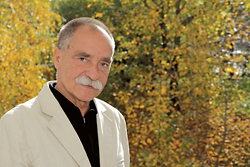 Pristine poet, poeta sacer, one of those who are familiar with the secret hidden in the heart of the language, the one who consecrates misfortunes of his nation and elevates sorrow to the level of spiritual gold. Apparently, he has easily overcome (according to Ranko Popović) the profound paradox of Serbian modern poetry, the gap between grandiose epic heritage and personal lyrical poetry, and exactly on those foundations he has built exceptional poetry of universal meanings. His golden poetic arch links together the mounts of homeland, early haiduk lyricism, powerful poetic foreboding of Serbian pagan myths, with elevated Christian spirituality of The Vigilant Eye. He links barley and costmary, lost home and eternal Serbian Kosovo temptation, and crowns it all with a vision of Herzegovina as a big port of the Temple not made by human hand under the dome of the skies. Pristine poet, poeta sacer, one of those who are familiar with the secret hidden in the heart of the language, the one who consecrates misfortunes of his nation and elevates sorrow to the level of spiritual gold. Apparently, he has easily overcome (according to Ranko Popović) the profound paradox of Serbian modern poetry, the gap between grandiose epic heritage and personal lyrical poetry, and exactly on those foundations he has built exceptional poetry of universal meanings. His golden poetic arch links together the mounts of homeland, early haiduk lyricism, powerful poetic foreboding of Serbian pagan myths, with elevated Christian spirituality of The Vigilant Eye. He links barley and costmary, lost home and eternal Serbian Kosovo temptation, and crowns it all with a vision of Herzegovina as a big port of the Temple not made by human hand under the dome of the skies.
Rajko Petrov Nogo (Borija, Kalinovik, 1945), undoubtedly, one of only a few fatefully important Serbian poets today.
Therefore, certainly, an honor to these pages.
It seems that you have chosen poetic quietude?
Public speaking gets increasingly difficult for me, because the public space has been covered by obscure personalities. Sharply speaking, and sharp speech is always the clearest! Heroes of our time are scum. Both above and underground there are those same people from the “Farm” and a serious person finds it offensive to be rhymed with them, because it is the same people in the entertainment and current politics, but also their favorites in literature. This is a kind of occupation and self-occupation and in such circumstances decent Serbs should not publish. So that it is clear once, when all this is finished, if it gets finished, who was explicitly silent. I live in Voždovac, the city is down there. I feel better in my own company. As soon as I go down, I meet people who no longer speak coherently, but, since I am not single-minded, maybe to them it seems that I do not speak coherently. On my hill that I call Zgubidan, I am losing my days and nights as I like, I grow old in solitude, because I chose to, in the silent room, in my work (maiden’s) room, like in a monastery.
When I get out on the balcony, I see a pine tree that we call Vasko, which was planted by my wife when Vasko Popa died. Our neighbors planted conifers that we call Aleksa and Jovan, and Milosav Tešić and I have recently planted an aspen tree from Tešić’s district, from his Gornja njiva, as if it is celestial, and we call it Stevan. We planted it when Stevan Raičković died. There, I am in a good company. Teša has promised that he will bring to me a turkey oak, to plant it and call it Momo Kapor. Trees and I used to whisper to each other before, and this conversation is now more intense. It is time to keep quiet, because there were times when I talked too much.
LEASED OUT THEIR BRAINS
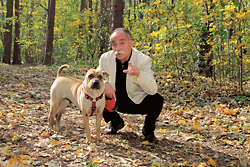 Despite being in quietude, or maybe just because of it, the concreting in commissary sections of some daily bulletins did not pass by you? Despite being in quietude, or maybe just because of it, the concreting in commissary sections of some daily bulletins did not pass by you?
The more I keep quiet and the more I do not participate in it, as you know, the more they attack me. I have stopped trying to understand where such fixations of concreting people come from. Simply, there is such hounded breed. With some exaggeration, I could say: “You just do your job, kid!” Just like Vukašin from Klepci said to that ustaša who cut his ears, gauged his eyes, and then lost his mind because of his bloodguilt, and was nursed by Neđo Zec, who left a testimony of that. Anyway, I should speak what I write, what is my main vocation. And that is a longer term speech. On remote control. Some will hear me, those who don’t, they will hear me, and if they don’t here me either now or later, so be it. Poetry and faith are our last strongholds that keep us in our identity, and everyone that walks on this Earth is committed to change our DNA. If something puzzles me, it is the high percentage of those who, as notorious Vuk Stefanović Karadžić would say, “leased out their brains”.
The more they marginalize us, the more expensive our words are. All this has been taking a long time. People have grown poor, and have been messed up for quite some time, but still those “mad Serbs” give signs of life and still put up resistance, although everybody around them have long ago stooped voluntarily. Anyway, that has been our fate since Vidovdan in 1389. If at that moment, later and in all subsequent temptations we had bent our backs and been “realistic” (whenever they tell you “be realistic”, they call you to collaborate), there would have been eighty million of us today, but we would have been called Muslims, Croats and what not. And this is how they are stealing our language today, for centuries they have been stealing our biological substance. As soon as a Serb would “cheat”, he would not only stop being a Serb, but would become sworn enemy of his former self. Thus the unionized, Islamized, “Arnautized” Serbs who, in these latest Balkan wars, fought so to say in the circle of an unhappy family, and therefore the so-called “warm Balkan crimes”, unlike the cold western industry of death.
WHAT IS A MAN WITHOUT
HOPE FOR RESURRECTION
“There is no resurrection without death”, our great poet says. Is that also our destiny, the ancient and the present?
As for death and Resurrection, keys for them are in the grave. It is not by accident that Emir Kusturica used Huxley’s sentence: “Death is unverified rumors” as the title for his autobiographical book. For those who believe, for Orthodox Christians, for Serbs, death is really unverified rumors, because they hope for Christ’s coming and resurrection, because they have tried this several times. Don’t they say: “Golgotha and Resurrection of Serbia”? Golgotha that is ongoing and Resurrection that we hope for. What is a man without such hope? An exotic bumblebee who lives only in the present, satisfying its miserable and base instincts. As one cynic used to say, “lives on
the level of a pet”.
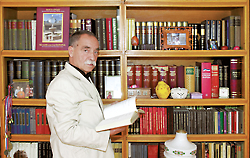 And what and where are the springs of your art? And what and where are the springs of your art?
For the first eight years I lived in a wooden cabin on the side of the road in Upper Herzegovina, in Borije near Kalinovnik, in a patriarchal, religious family, where forms of life had not been changed for centuries. When I was left all alone in the world, and fell from those altitudes into an orphanage, I still found someone to call my own, and that is Serbian language. That is how the orphan found his ancestors, and the best ones, Milija Podrugović, Njegoš and others. Since then, I have been living in that house and that is why I can be so calm. And it is then that those who do not live in that house, those mondialistic homeless people, defame me. I know who I am, I also know who I belong to, and if I could choose, I would still chose to be exactly that, and exactly to be a tenant of that house. I like Tin’s verses:
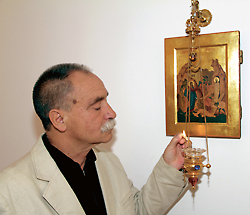 Am I not a poet, a sufferer at least Am I not a poet, a sufferer at least
And sometimes my wounds are dear to me,
For each cry will turn into gold
And into a necklace my tears will grow.
When I am in language, when I am in being, then I am at peace with myself. And at peace with others. And when I am not, I am good for nothing, and I go back to my homeland as fast as I can so that those hills would not forget me, to fill myself with those “early sorrows”, to flutter and get proof that I am alive. And, as one Polish poet would say, to fetch from those forests of mine two-three poems that have been rotting there for several winters. When I go home, I tame my arrogance, to which, let me be ironic, Chrysostoms are prone. Over the housing filled with elder-berries, on low and wretched path of home that, just like that Andrić’s, Višegrad path, followed me wherever I went, I cannot lose threads, or imagine or relearn anything. “I am who I am”, the Teacher used to say. When we made a movie about my poetry, I asked the cameraman to sharpen the image when shooting landscapes, so that once I cannot go there any longer, I can run it on this devil’s machine, television, to watch and cry. I know I will cry, because Raičković was telling me how, lonely and old, he used to cry even when watching commercials. To avoid crying at commercials, I will cry at my landscapes. Everything is like it should be, we could have not been born at all. Birth is God’s gift, no matter what kind of life you have. That tiny light between two darknesses.
UNTIL THE WORLD HAS GONE MAD
In your abundant poetic work, among those wonderful handfuls of Serbian poetry, is there a poem that is dearest to you, special, your Song of Songs?
Critics often mention “Ripe Wheat, Fairy Dale, Blue Basil”, “Let It Snow, Lord” (consecrated by Svetislav Božić with his music), “Not Everything Was Destroyed When Everything Was Destroyed”. I have written probably ten poems that Serbs, I hope, will like to read and hear, if there are Serbs. I twist this against spell: “Roads will needs Serbs, but Serbs will be no more”. Even the awareness of that possibility disables it. When Raičković published his complete works, he asked to have them weighed. Then he turned to me and, in the way so typical for him, asked me: “And what if this was all in vain?” And then, at the table in a tavern he comforted himself. He was sitting with his brother, both were silent, and then his brother, a clerk with years of service, finally told him: “You’ve got away!” There, he said, at least I did not have to work from eight to three.
To write poetry, you don’t need anything. Even in prison, and that is an excellent work place for a poet, Đogo used to tell me, if they don’t give you paper, you can memorize and exercise your brain. Anyway, poetry is oral, and sometimes labial activity, because, if it isn’t on the lips of young people who speak that language, it should not have existed. Until the world went mad, and it did go mad, certainly, peoples were recognized by poetry. The heroes of our time, those who are scum, what are they recognized by?
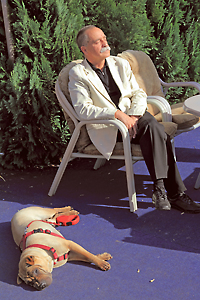 You have recently supplemented your famous collection Ne tikaj u me. Where does such fascination with tombs, ancestral graves come from? You have recently supplemented your famous collection Ne tikaj u me. Where does such fascination with tombs, ancestral graves come from?
In addition to tombs being a sensation of my early childhood (because the most beautiful necropolises are in the homeland of my father and especially in the homeland of my mother), in addition to those stone books being a link from Kosovo to our oral tradition, there is also another reason why I approached all that in my maturity. It is a flagrant theft, theft of graves. Because, if we do not share the same ancestors, and our former brothers do not want to share the same ancestors, why do they find other people’s graves so attractive? Our historians, both lay and clerical, behaved carelessly. When this theft was at the beginning, they would waive their hand and say that it is nonsense and lie and myth making, and that we should not pay attention to it. However, that lie has its energy, and if, on top, it comes with persistence, it rules like weed. There, they again waive their hand at the lie that our Nemanjić’s monasteries on betrayed Kosovo, first belong to the Byzantine, then to Kosovo, and some say that they belong to Albanians, namely to Arnauts. Miloš Obilić is already a famous Albanian hero. People and their intelligence who are so “nonchalantly” treating what belongs to them, will lose what they have. Where I can, and with the gift God gave me, if at all, I don’t give away what is mine.
***
Non-integrated
– At the beginning I asked you to publish this interview in “ekavica”. Since Montenegrins separated, I find it offensive to write in “ijekavica”. Why would the tortured Serbia need my word of difference? Our tragedy is, among others, reflected in the fact that we are not integrated people, the fact that we lived under different conquerors, and that our regional differences, our distinctness, are still so alive that any enemy could easily inflame them.
***
Comedy of Language
– The fact that Serbian language was first called Croatian as well, then Bosnian and Montenegrin, and the fact that all these languages, as Matija said, are better (and maybe exclusively) learned in Serbian, is irony, and maybe a comedy of our time. You don’t have to be a Serb to speak Serbian. So many people speak English and it does not matter. A gifted writer and poet can write an exceptional work in a dialect, but dialect as official, standard language is a real comedy. It must be laughed at by those introducing it as well. There is one Shakespeare’s verse, I think spoken by Hamlet: “I zmije ću da jedem!” In one early Macedonian translation that verse was translated as: “I karakondžule ću apam!” Let our new former brothers in language “chow monsters” as much as they want. What does Serbian language has to do with it?
***
“Barley and Costmary”
– It is a language-music box packed in four strophes with a prologue and epilogue poem. It is an oxymoron. On the outside hollow syntax series and poetry inside. Barley is wheat, “seed is noble”, and you can live on it. Costmary is Our Lady’s flower of family happiness, it is what you live for. Costmary grows and smells around the house, especially when there is no house. Costmary and barley of the memory, lullaby of the first happiness and first sorrow.
***
Surfacing
– None of it is finished, not a single issue in the Balkans has been solved. New restructuring of the Balkans is yet to come. Historical experience warns that these could be divisions that are always at the detriment of Serbs. But, who knows?! I comfort myself with the famous Dučić’s sentence: “As soon as our enemies start thinking that we have drowned, we surface on a place unknown to them.” That’s how it always was. When you resurface on a place unknown to them, let me know, so that up there, in that Upper, better Serbia, I can rejoice.
|
